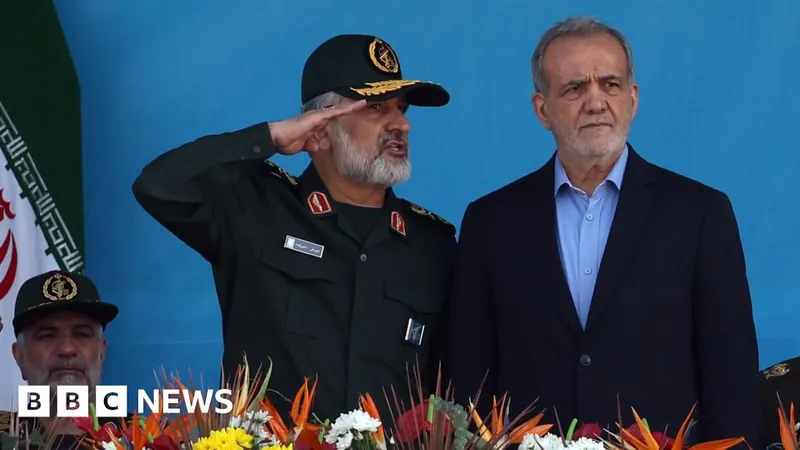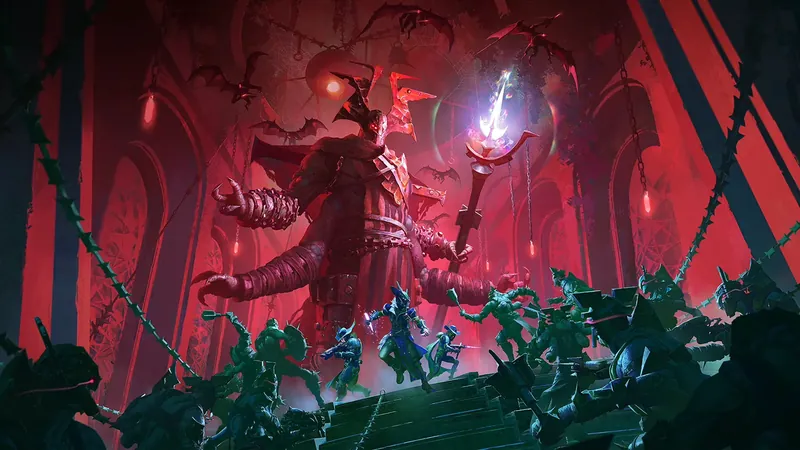
Iran's Tenuous Balance: To Strike or Not Amidst Hezbollah's Struggles
2024-09-26
Author: Jessica Wong
Introduction
Iran is currently caught in a critical dilemma: should it show restraint or exact revenge in response to Israel's aggressive actions against its long-standing ally, Hezbollah? The strain in Iran's decision-making comes at a time when hardline conservatives express growing discontent with the perceived passivity of their government in the face of Israel's military campaigns.
Diplomacy Over Confrontation
In a recent address to the UN General Assembly, President Masoud Pezeshkian condemned Israel's operations in Gaza and the threat they pose to Lebanon but opted for a surprisingly diplomatic approach. Unlike his predecessors, Pezeshkian's rhetoric focused on seeking peace rather than threatening annihilation against Israel. His government also indicated a willingness to resume nuclear negotiations, aiming for a conciliatory stance amid rising tensions.
Leadership's Cautious Tone
The Iranian leadership, including senior officials and commanders from the Islamic Revolutionary Guard Corps (IRGC), has similarly adopted a restrained tone regarding potential retaliation. While Iran has historically provided extensive support to Hezbollah—training, funding, and military resources—the leadership seems cautious, recognizing that Hezbollah acts as a crucial deterrent against Israeli incursions.
Recent Incidents and Internal Pressure
Recent events have intensified this dilemma. Last week, an explosion injured Mojtaba Amani, Iran’s ambassador to Lebanon, at the Iranian embassy in Beirut, which Iran attributed to an Israeli attack. However, in stark contrast to previous skirmishes, Iran did not issue any immediate threats of retaliation following this incident. This is notable given Iran's swift response to a previous Israeli strike that killed several high-ranking IRGC commanders.
Criticism from Hardliners
Critics within Iran, particularly those aligned with Supreme Leader Ayatollah Ali Khamenei, have condemned Pezeshkian's non-confrontational dialogue with the US media, suggesting it undermines Iran’s standing among its supporters. The President’s scheduled press conference was abruptly canceled amidst this political firestorm, signaling potential internal pressures and the overarching influence of the IRGC in strategic planning.
Khamenei's Shift in Tone
Khamenei himself, while addressing veterans recently, refrained from discussing retaliation against Israel, demonstrating a notable shift in tone from previous declarations. This restraint raises questions about Iran's confidence in its military capabilities and its willingness to escalate conflicts, especially with the looming threat of a US military response should hostilities escalate.
Pressure from Hezbollah
Adding another layer to the narrative, Barak Ravid of Axios reported that Hezbollah is pressuring Iran for support in its struggle against Israel. However, Iranian officials reportedly conveyed that the current timing for intervention is not favorable, illustrating the precarious nature of their alliance.
Domestic Complications
Internally, Iran's domestic issues complicate the calculus further. The economy is battered from severe US sanctions, and unrest continues among the populace. Engaging in a conflict with Israel risks provoking a larger US retaliation that could destabilize the regime further, prompting a potential rebellion from Iranian opposition groups emboldened by the turmoil.
Implications of Iran's Decisions
The implications of Iran's actions are profound. If Tehran decides against intervening in Hezbollah's conflict, it runs the risk of undercutting its influence and credibility among allied militias in the region. This could create a dangerous precedent, suggesting that, in moments of crisis, Iran may prioritize its own survival over the needs of its allies.
Conclusion
In a volatile region where alliances are crucial, Iran finds itself grappling with an increasingly complex strategic landscape, balancing its regime's fragility against the needs of its allies. As the situation unfolds, all eyes remain glued to Tehran and its next moves—will it take a stand or choose to watch from the sidelines? The world waits with bated breath, as a decision one way or the other could shape the geopolitical landscape in the Middle East for years to come.



 Brasil (PT)
Brasil (PT)
 Canada (EN)
Canada (EN)
 Chile (ES)
Chile (ES)
 España (ES)
España (ES)
 France (FR)
France (FR)
 Hong Kong (EN)
Hong Kong (EN)
 Italia (IT)
Italia (IT)
 日本 (JA)
日本 (JA)
 Magyarország (HU)
Magyarország (HU)
 Norge (NO)
Norge (NO)
 Polska (PL)
Polska (PL)
 Schweiz (DE)
Schweiz (DE)
 Singapore (EN)
Singapore (EN)
 Sverige (SV)
Sverige (SV)
 Suomi (FI)
Suomi (FI)
 Türkiye (TR)
Türkiye (TR)